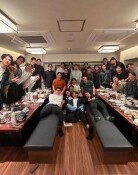Real income effectively reduced amid inflation hikes
Real income effectively reduced amid inflation hikes
Posted May. 24, 2024 07:59,
Updated May. 24, 2024 07:59

A man surnamed Kang, 36, who works for a small construction company, has effectively seen his wages cut this year. As the construction sector struggles, the aftermath of delays in payments to site workers has extended to office employees such as Kang, whose salary remains frozen at last year's level.
“There's no source of extra income, yet the price of everything from diapers to daily meals has gone up,” said Kang, whose wife gave birth two months ago. “Some of my colleagues have been forced to sign pay cut agreements, so I have to be grateful just to have a job.” This year, he has started bringing his own lunch and coffee to work to save money.
With inflation soaring, households' real income has dropped the most in seven years. While nominal income has risen, the sharper increase in prices has effectively reduced purchasing power. The economic downturn has left salaried workers facing the tightest squeeze on their finances on record, and small business owners have seen their earnings decline.
According to data released by Statistics Korea on Thursday, the average monthly household income in the first quarter of this year was 5,122,000 won, a 1.4% increase from 5,054,000 won in the same period last year. However, this growth is much slower than the 3.9% increase seen in the fourth quarter of last year.
Adjusted for inflation, real household income actually fell by approximately 1.6% compared to a year earlier, marking the largest decline since the first quarter of 2017 (-2.5%). With food prices and other costs continuing to rise by around 3%, household finances have accordingly worsened.
The average monthly wage income for workers was 3,291,000 won, down 1.1% from 3,326,000 won a year earlier, even in nominal terms. When adjusted for inflation, real wage income decreased by 3.9% over the year, the largest first-quarter drop since the relevant statistics began in 2006. Business income for self-employed individuals rose by 8.9%, but income for small business owners actually fell.
“Household real income has declined because income has not increased in line with inflation,” said Lee Jin-seok, head of the household income and expenditure section at Statistics Korea. “The significant reduction in bonuses from companies last year appears to have contributed to the sharp drop in wage income.”
세종=송혜미 기자 1am@donga.com · 세종=김도형기자 dodo@donga.com







